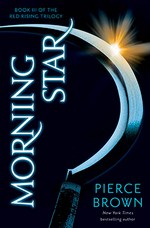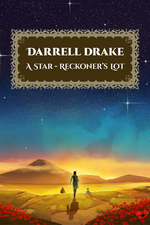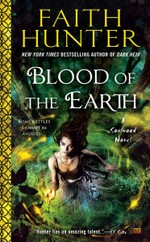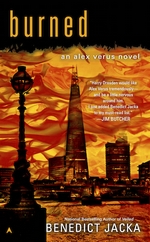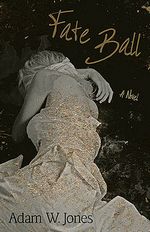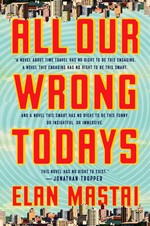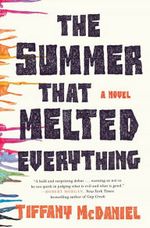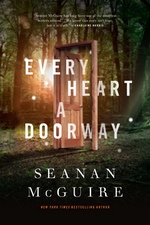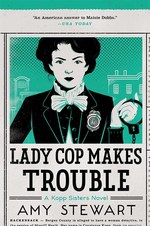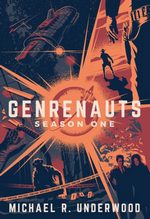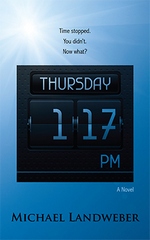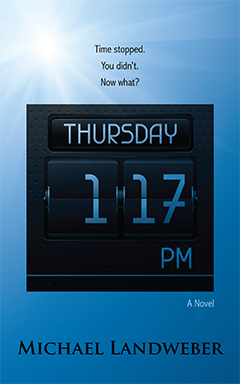Given the large number of audiobooks I listened to in 2020, I sort of felt like I had to focus on them for one of these posts. But how to keep this from being just a rehash of the other best of lists? Well, I focused on the audiobook experience over the content. What was it like to listen to it? How engaging was it, how did the narrator do? Was it a good match in terms of tone, content, and performance?
Truth be told, this was a harder choice than I expected. Also, a couple of books that were in my mental rough draft didn’t make it to the final version when all was said and done (I’m still not sure I made the right call on a couple of these).
(in alphabetical order by author)
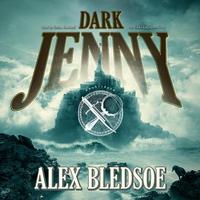 Dark Jenny
Dark Jenny
by Alex Bledsoe, Stefan Rudnicki (Narrator)
My original post
Stefan Rudnicki brilliantly captures the humor, the confusion, the determination of Eddle LaCrosse and the situation he finds himself in—and then the horror, revulsion, and anger he has when he discovers what’s really going on. Starting with one of Bledsoe’s best books, Rudnicki goes on to bring it to life.

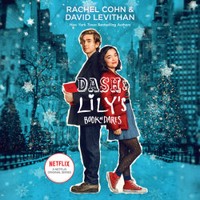 Dash & Lily’s Book of Dares
Dash & Lily’s Book of Dares
by Rachel Cohn, David Levithan, Ryan Gesell (Narrator), Tara Sands (Narrator)
My original post
For me, this book came along at the right time—its particular brand of silly and escapist sweetness was exactly what it turned out that I needed. Add in a couple of stellar performances from Ryan Gesell Tara Sands and it’s just a delight. They can make you believe (even temporarily) in the magic of Christmas and young love.


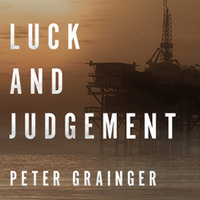 Luck and Judgement
Luck and Judgement
by Peter Grainger, Gildart Jackson (Narrator)
My original post
I’ve said it before, and I’ll keep on saying it: there’s a certain magic, an ineffable alchemy about Jackson narrating Grainger’s work. It’s just fantastic, I think I’d have liked these audiobooks with another narrator (or in print), but I don’t think I’d have liked them as much.
I could’ve listed each book in this series here, but I limited myself to this one because it’s an atypical crime for a novel, the solution (and how Smith and his team come to it) is offbeat, there’s some great humor and great emotional beats, too. It’s Grainger at his best and Jackson delivers it perfectly. There is a strong sense of humanity in these books, not just in the protagonists, but in the victim, the killer, the witnesses, the people who aren’t the killer but who aren’t up to anything legal/moral/ethical…everyone. There’s no one cartoon-y or over the top (in any direction).


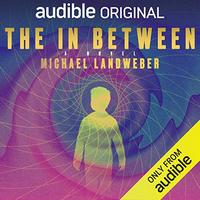 The In Between
The In Between
by Michael Landweber, Brittany Pressley (Narrator), Mark Boyett (Narrator)
My original post
This is the story of what happens to a family when a young child goes missing during a teleportation trip that his parents make successfully (to put it too succinctly) It’s a gripping listen and wonderfully performed. As you may have guessed Brittany Pressley narrates the chapters from the mother’s point of view, and Mark Boyett takes the father’s. I don’t think I’d heard anything by either of them before—but I’ll keep my eyes peeled for their names when I browse for audiobooks in the future. They truly did wonderful jobs. They got the emotion of the moment, the tension—and occasional moments of fun, joy, or relief—as well as giving a real sense of the characters. It didn’t happen often, but even when a character usually only seen in a Lillian chapter showed up in a Jackson, you could recognize them (and vice versa)—which was nice. Landweber wrote a great story but Boyett and Pressley brought it to life.


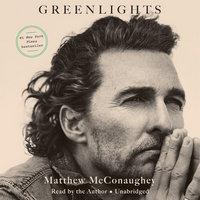 Greenlights
Greenlights
My original post
When Chris Hardwick interviewed McConaughey recently he described the audiobook as McConaughey playing McConaughey, which is a great way to put it, and I wish he’d posted this before I wrote about the book so I could’ve borrowed it then. But that’s it exactly, Yes, it’s his stories, but yeah, he’s performing. It feels like you’re sitting around the campfire or a table in a bar, listening to a great storyteller at work.


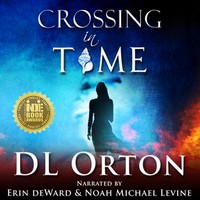 Crossing in Time
Crossing in Time
by D. L. Orton, Noah Michael Levine (Narrator), Erin deWard (Narrator)
My original post
Typically, when I post about an Audiobook, I close with a discussion about the narrator(s). But I started with it when I posted about this novel because Levine and deWard did such a great job, they’re the highlight of the experience for me. Typically, when there is a male narrator and a female narrator—the female will read all the narration and dialogue in the female character POV chapters, and the male will read all the narration and dialogue in the male character POV chapters. But here, deWard reads all the female dialogue, no matter the narrator (and vice versa). That’s a nice touch, and once I got used to it, I really appreciated it. Particularly, it helped the conversations between characters feel like conversations—there was a little bit of talking over each other, and so on. And when the two laughed together? That was either fantastic work by the narrators or by the editor (or both).
I’m not that sure how much I’d have enjoyed this book in print, but the way these two embodied the book made it one of the highlights of the year.


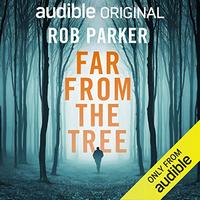 Far from the Tree
Far from the Tree
by Rob Parker, Warren Brown (Narrator)
My original post
This was an Audible Original, so the Audiobook experience is a big part of it. Brown was a great choice of narrator—he’s the perfect voice for this material. He captured and shaped the tone as he needed to, and gave the right performances for each character.
I can’t help feeling like I need to say more, but I just don’t know what else to say. If I had problems with the performance, I’d probably be able to go on longer, but when a narrator gets it right, like Brown does here, what else is there to say? It was a brutal, brutal experience, with more twists than I can count, and a plot so complex I’m not able to talk about it in this small space.


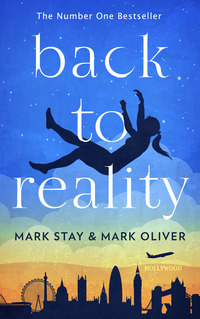 Back to Reality
Back to Reality
by Mark Stay & Mark Oliver, Kim Bretton (Narrator)
My original post
This is sort of a Fringe-inspired take on a Back to the Future/Freaky Friday mashup, and it’s as odd, and fun as that description makes it sound.
I’ll frequently (maybe too frequently?) talk about an audiobook narrator bringing the text to life. And Kim Bretton does that. But she does more than that—she fills it with life. Dynamic, energetic, vibrant…are just some of the adjectives that spring to mind. I was very happy when I just looked over her other audiobook credits and saw a couple of titles I was already thinking about—if she’s doing them, I’m giving them a try. (although, if I never hear her do another American male accent, I’d be more than okay).
Funny, sweet, amusing, heartfelt, laugh-inducing, touching, comic, imaginative—and did I mention humorous? This is 606 minutes of pure entertainment. I really encourage you to put this in your ear-holes. It’d probably work almost as well in print—Bretton’s great, but she has to have something to work with—but in audio? It’s close to a must-listen.


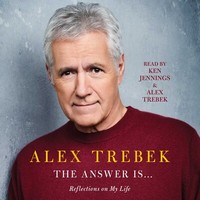 The Answer Is . . .: Reflections on My Life
The Answer Is . . .: Reflections on My Life
by Alex Trebek, Narrated by: Ken Jennings, Alex Trebek
My original post
Jennings was a great choice of narrator, since his time on Jeopardy!, the two are linked in the collective consciousness, and they clearly have a good relationship. He sounds like a natural when it comes to narration. But his work is overshadowed by the few chapters he didn’t read.
Trebek read a few chapters himself—the one about why he swears so often (it surprised me, too), the one talking about notable Jeopardy! contestants (like Jennings), the one about his wife (Trebek didn’t like the idea of someone else talking about his wife that way), and the last chapter, where he discussed his cancer and coming to terms with his impending death. I understand why he couldn’t do the entire book himself, but I’d have preferred it (nothing against Jennings—I’d have been content with Jennings doing the whole thing). But I’m so glad he did those chapters, you could hear the sincerity in his praise for Jennings, Eddie Timanus, Cindy Stowell, and others; his love for his wife; and the resolution and contemplation he’d put into his final days


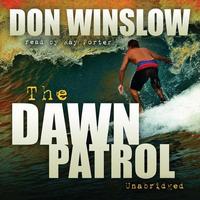 Dawn Patrol
Dawn Patrol
by Don Winslow, Ray Porter (Narrator)
Wow. Despite this being my first and favorite Winslow novel, I wasn’t inclined to grab the audiobook. But then it was on sale and a fellow Winslow-fan recommended Porter’s take on the book. I didn’t know that Porter did audiobooks before this, but he’s on my list to watch for now.
I don’t know how to describe this—I was blown away. I’ve read the book two or three times, but Porter made it feel like it was all new. I was gripped. I was entertained. I was heartbroken. It’s as good as you can ask for an audiobook to be.

![]()




